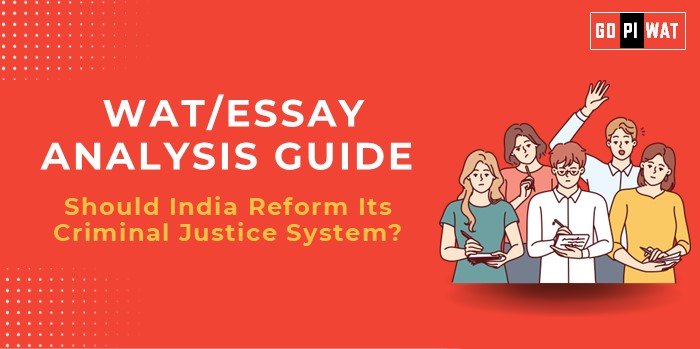📋 Written Ability Test (WAT)/Essay Analysis Guide: Should India Reform Its Criminal Justice System?
🌐 Understanding the Topic’s Importance
India’s criminal justice reform is crucial for ensuring timely justice, reducing undertrial populations, and improving global rankings in law enforcement efficiency.
⏳ Effective Planning and Writing
- Time Allocation:
- 📝 Planning: 5 minutes
- ✍️ Writing: 20 minutes
- 🔍 Review: 5 minutes
💡 Introduction Techniques for Essays
-
- Template 1 (Contrast):
“India boasts the world’s largest democracy but struggles with a justice system overburdened by 42 million pending cases. This paradox underscores the urgent need for reform.”
-
- Template 2 (Timeline):
“From colonial-era legal systems to digitized courts today, India’s criminal justice system has seen change. Yet, persistent delays call for sweeping reforms.”
📖 Structuring the Essay Body
- Achievements:
- ✅ Fast-track courts for cases requiring urgent resolution.
- 📜 Success of the POSCO Act in addressing crimes against children.
- 💻 Digital initiatives like e-Courts improving access and transparency.
- Challenges with Comparative Analysis:
- ⚠️ Judicial delays due to underfunding and staff shortages.
- 📉 High undertrial populations—contrast with Singapore’s efficient judiciary.
- Future Outlook:
- 🤖 Technology-driven reforms like AI for case tracking and prioritization.
- ⚖️ Expansion of legal aid to underserved populations.
- 📈 Strengthening judicial accountability through transparency measures.
📄 Concluding Effectively
-
- Balanced Conclusion:
“Reforms in India’s criminal justice system are imperative to uphold democratic values. By learning from global best practices, India can ensure justice is accessible, swift, and fair.”
-
- Global Example Conclusion:
“Adopting innovative solutions like Singapore’s court management systems can transform India’s criminal justice system, making it a model for the world.”
✍️ Sample Short Essays
-
- Balanced Perspective:
“India’s criminal justice system needs reforms to reduce pendency and improve transparency. While resource constraints pose challenges, adopting technology and global practices can offer solutions.”
-
- Solution-Oriented:
“Streamlining court procedures through AI and increasing legal aid access are critical for India’s judicial reform.”
-
- Global Comparison:
“India can learn from Singapore’s judicial efficiency and the USA’s plea-bargaining practices to reduce delays and ensure fairness.”


